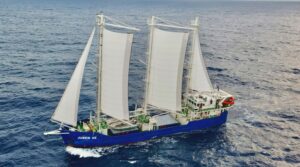Micronesia takes the lead
When looking for news on wind assisted propulsion, we frequently come across the very active Micronesian Center for Sustainable Transport. It’s time to get to know them better and maybe learn from them.
Every week we scan hundreds of websites and read dozens of press releases. We filter news about sailcargo, sailtraining and wind-assisted ship propulsion and a wide range of related subjects. For you, dear reader. Headlines from European start-ups are dominant. Every week there are new developments in wing-sails, Flettner rotors and full-sail newbuilds, an area where French enterprises are currently in the lead. But almost every week there is also some new from an intriguing organization: the Micronesian Center for Sustainable Transport (MCST). Their projects and publications often sound activistic and political:
- “Flipping the IMO“: negotiate for high ambition outcomes in the International Maritime Organization (IMO) in relation to reducing emissions from international ships.
- “IWSA Pacific Hub“: the Pacific Wind Propulsion Hub will serve as an epicenter for building capacity and exchanging experience, knowledge and best practices around wind propulsion technology use.

But there is also a practice what you preach attitude. Some projects result in local sustainable transport solutions. Two cargo vessels mainly propelled by wind are in operation, The SV Kwai and the Juren Ae on which we reported last year.
The Wingship Project aims to use Wing in Ground technology (WIG) – the ability to fly boats at high speed just a few meters above the sea surface with major fuel savings as opposed to conventional ships or aircraft.
So what is this organization and why are they speaking out so loud?
Micronesia
Micronesia is a subregion of Oceania, consisting of approximately 2,000 small islands from 7 countries in the Southwestern Pacific Ocean, roughly east of Indonesia. The total population is just over half a million people. Guam, a US territory, has the most inhabitants, but the Marshall Islands are probably more commonly known. Most of the Islands are atolls, ring-shaped islands including a coral rim that encircles a lagoon. And most of them rise only a few meters above sea level.
WindAssist comes from The Netherlands. About 35% of this country lies below sea level behind levees (or dikes, in a more European context). So with climate change growing out of control Holland (with most of its inhabitants and economic activity) could become part of the North Sea. But the Netherlands are a rich country, and to our civil engineers even the IPPC 2 degree scenario secretly sounds more like an interesting challenge than an existential threat.
But imagine being a country in the Pacific formed mainly by atolls. Imagine what this does to your sense of urgency with climate change. This is where the MCST comes in.
What is the MCST?
In their own words: “MCST is a project to build and operate a Pacific country-owned and -focused world-class Centre of Excellence as a research engine to empower the long-term decarbonization of Pacific transport and the advocacy of the Pacific in related international fora and negotiations.”
It is primarily a knowledge portal and a network of leading researchers. MCST was born out of the lead up to the Paris Agreement and is hosted by College of the Marshall Islands on the Majuro atoll. They run a well-dressed website and are very active on digital and physical international podia about climate and transport, like the IMO working groups.
The MCST is not only strongly aware of the impact of sea level rise on Micronesia, but also on the dependence on transport of island nations. Transport is the region’s largest fuel user, orders of magnitude more than the ‘low hanging fruit’: electricity generation.
“For Tuvalu, climate change is not a distant threat—it is an immediate reality. [..] The shipping industry must not be exempt from its responsibility. A universal greenhouse gas levy is not just about reducing emissions; it is about survival, about justice. The revenues from this levy must be directed toward those on the frontlines—the nations facing existential threats due to emissions they did not create.”
6PAC+
Geopolitical backing for MCST reports and statements often comes from the ‘6PAC+ Alliance’. Completely unrelated to 6-packs. PAC originally comes from Pan-African Congress and 6PAC from the sixth Pan-African Congress in 1974. The 6PAC+ Alliance is a coalition of 51 like-minded high-ambition Pacific, Caribbean and African Island nations that frequently position themselves as victims of climate change.
Finance and partners
Projects are mainly financed by European development organizations, like the German Gesellschaft für Internationale Zusammenarbeit (GIZ). Likewise, their are partnerships with European scientific institutes like University of Applied Sciences Emden/Leer that has an institute focused on Green Shipping. The Wingship Project is backed by Korean researchers and financing.
The motto in the Marshall Islands local language: wa kuk wa jimor – canoes bring people together.
Sources: mcstrmi.org and Wikipedia



